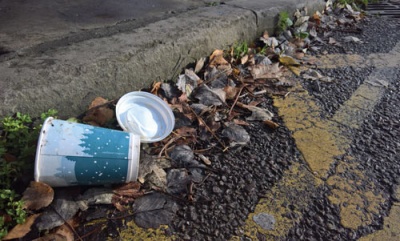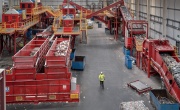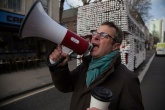Coffee cup debate rages on as Veolia launches office recycling service
Waste services firm Veolia has launched a national coffee cup recycling service for offices after research found that over half of regular takeaway hot drink consumers dispose of their cup at work.
 The YouGov poll found that 52 per cent of those that buy at least four or more drinks a week take their cup to work and get rid of it there, and with 84 per cent of consumers still using disposable cups, Veolia’s service has been established to collect cups as soon as they have been finished with to reduce contamination and increase recycling rates.
The YouGov poll found that 52 per cent of those that buy at least four or more drinks a week take their cup to work and get rid of it there, and with 84 per cent of consumers still using disposable cups, Veolia’s service has been established to collect cups as soon as they have been finished with to reduce contamination and increase recycling rates.
Around 2.5 billion takeaway coffee cups are thrown away in the UK every year – 5,000 a minute – many by busy commuters on their way to or from work. Due to the complex structure of the cups meaning they aren’t compatible with traditional paper recycling streams however, only around six million of these cups are recycled annually, less than 0.25 per cent.
The new scheme follows hot on the heels of environmental behaviour change charity Hubbub’s Square Mile Challenge, which saw companies from the City of London – the UK’s most densely officed area – sign up to collect cups on their premises. By introducing recycling facilities across the area, home to around 18,000 businesses employing over 450,000 people, Hubbub hoped to recycle 500,000 cups throughout April, with five million extra cups collected by the end of 2017.
Veolia’s scheme will capture cups before they enter the general waste stream, with specially-designed bins asking users to ‘tip it, flip it and stack it’ to make sure any remaining liquid is drained and the lid, sleeves and cup are separated.
The company will then carry out a further separation process to ensure that all rogue items have been removed to ensure that the material can be kept at a high quality.
Commenting on the launch, Estelle Brachlianoff, Senior Executive Vice-President at Veolia UK & Ireland, said: “Over the last six months a lot of activities have been taking place with our customers, such as Costa and Starbucks to overcome our biggest challenge – contamination in the cups. As a result, we’ve worked on a solution that will separate the cup from the general waste stream as soon as the customer has enjoyed their drink.”

Brachlianoff added: “The research highlights the integral role we all play in creating a sustainable future by ensuring our resources are kept in the loop for longer. When it comes to coffee cups, I’d like to take this opportunity to further encourage a mass collaboration between designers, manufacturers, vendors and consumers as we all have a part to play in the ultimate solution – as well as those less obviously involved in helping to recycle coffee cups, such as offices, campuses and train stations.”
Debate on best response to coffee cup waste rages on
Since bursting into national consciousness last year following Hugh Fearnley-Whittingstall’s Hugh’s War on Waste documentary, the debate over the best way to address the problem of hard-to-recycle but easy-to-create coffee cup waste has been raging.
Some have suggested that simple reduction measures, to make consumers use fewer disposable paper cups and instead bring reusable cups to cafes, through incentives or fees similar to the plastic bag charge have been suggested and, last year, rejected by the government.
A study carried out by coffee manufacturer Bewley’s and the University of Cardiff earlier this year found that up to 300 million cups could be saved every year through preventative measures like charges and environmental messaging. The German city of Freiburg last year launched a reusable cup deposit scheme that saw dishwasher-friendly cups being handed out to consumers for deposits of one euro. Once used, the cups can be returned to any café or bakery where they are washed and the deposit recouped by the user.
Others on the other hand, like Fearnley-Whittingstall himself, believe that the problem will not be adequately addressed until cups that can be more easily recycled are developed.

“As a nation of coffee drinkers we shouldn't have to rely on specific, geographically-limited, initiatives that can be expensive and require high levels of consumer engagement for recycling impact,” said Myerscough. “Simply, this will hardly scratch the surface, especially given an expected 30 per cent growth of coffee shops in the next five years.
“The cost-effective solution is to develop a product that is suitable and recyclable in the existing system. Encouraging the development of genuinely recyclable paper products means we will not have to reform the system and can use the already substantial national recycling infrastructure at a local level more effectively while driving innovation across the sector."
Veolia’s new scheme has been more firmly supported by Chris Stemman, Executive Director of the British Coffee Association (BCA), the voice of the UK coffee industry, who said: “We wholeheartedly welcome and support Veolia’s innovation in recycling coffee cups from the office space.
“This represents a long-term sustainability solution that advances the all-important circular economy. Unlike taxation on paper cups and some other measures that have been proposed until now, this represents a clear solution that deals with the problem directly. It’s a big step forwards.”
The YouGov research found that 88 per cent of the public would use a purpose-built recycling bin to ensure their disposable paper cup is recycled. Almost half (47 per cent) would even be willing to hold onto their cup for longer if they knew they would pass a purpose-built bin.
Prior to launching the service Veolia conducted trials with Costa and Starbucks, two of the major café chains in the UK, and the BCA has, in the past, stated its preference for developing long-term recycling solutions over the introduction of preventative measures like charges.
Before the surprise calling of the snap general election earlier this year, Parliament's Environmental Audit Committee had been carrying out an inquiry into measures to address the rising amount of disposable packaging. It remains to be seen whether this investigation will be continued when the committee is reconvened.










